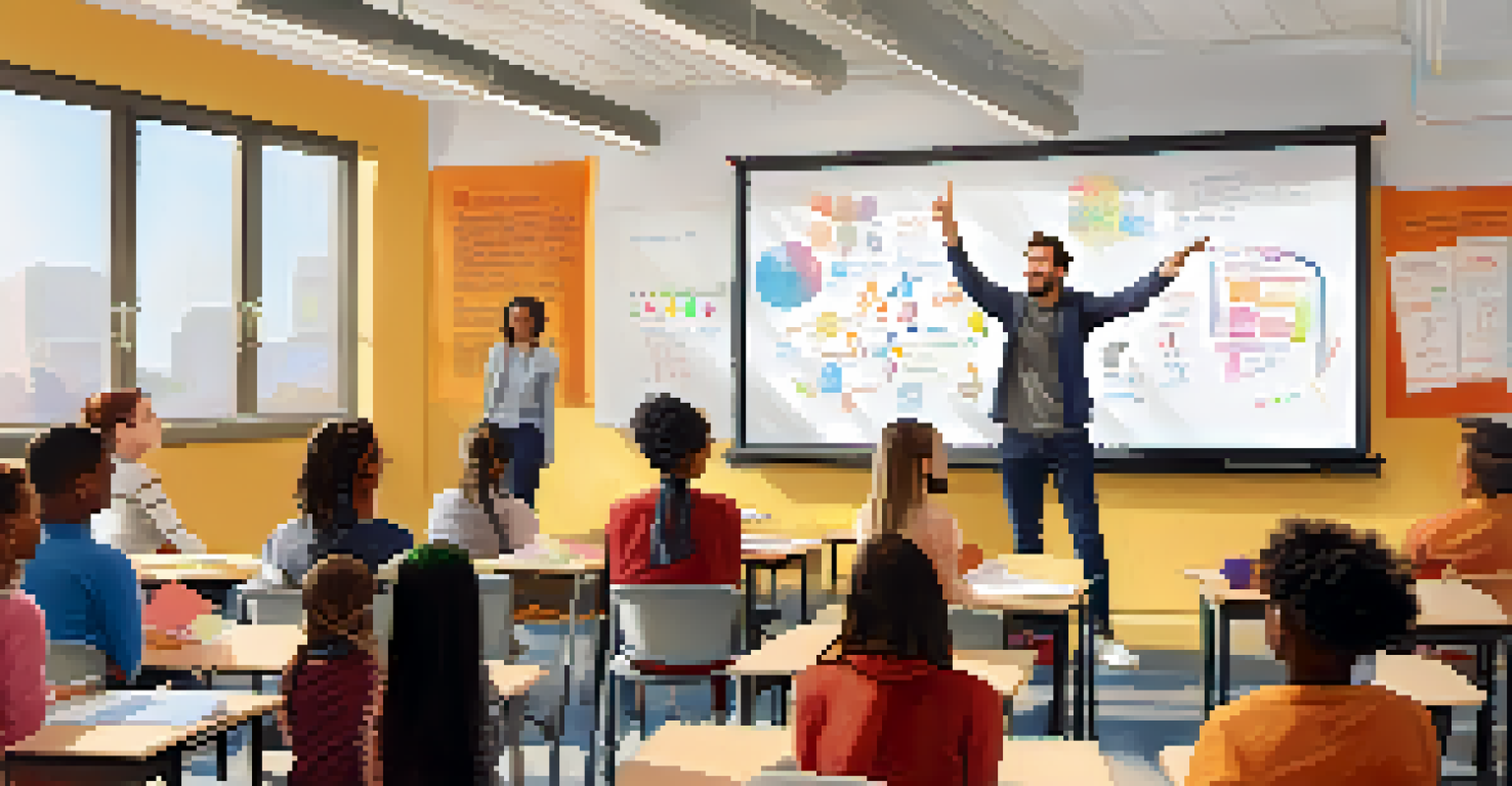Creating a Supportive Environment for Skill Acquisition

Understanding the Importance of a Supportive Environment
A supportive environment is crucial for anyone looking to acquire new skills. It not only boosts confidence but also encourages persistence when challenges arise. Think of it as the fertile soil where a seed can grow; without it, even the strongest seed will struggle to thrive.
The only way to do great work is to love what you do.
When individuals feel safe and valued, they are more likely to take risks and step out of their comfort zones. This is particularly important in skill acquisition, where making mistakes is part of the learning journey. A nurturing atmosphere allows learners to view setbacks as opportunities for growth rather than failures.
Moreover, a supportive environment fosters collaboration and peer learning. When people share their experiences and knowledge, it creates a rich tapestry of learning that benefits everyone involved. This collective support can significantly enhance the skill development process.
Establishing Trust Among Learners and Instructors
Trust is the cornerstone of any supportive learning environment. Without it, learners may hesitate to share their thoughts or ask questions, ultimately hindering their skill acquisition. Building trust can start with simple gestures, like open communication and active listening.

Instructors play a pivotal role in establishing this trust. When they demonstrate empathy and understanding, learners feel more secure in expressing their uncertainties. For instance, an instructor who shares their own learning experiences can humanize the process and make it easier for students to connect.
Supportive Environments Boost Growth
A nurturing atmosphere encourages learners to take risks and view mistakes as growth opportunities.
Moreover, fostering trust encourages feedback and constructive criticism. When learners know that their input is valued, they are more likely to engage and contribute, creating a richer learning experience for everyone involved.
Encouraging a Growth Mindset in Learners
A growth mindset, the belief that abilities can be developed through dedication and hard work, is essential for skill acquisition. Encouraging this mindset can significantly impact how learners approach challenges. For example, praising effort rather than innate talent can motivate learners to see challenges as opportunities.
Mistakes are a fact of life. It is the response to the error that counts.
In a supportive environment, mistakes are seen as a natural part of the learning process. When learners understand that setbacks do not define their abilities, they are more likely to experiment and take risks. This shift in perspective can lead to deeper learning and mastery of new skills.
Incorporating growth mindset principles into the learning environment can be as simple as using language that emphasizes effort and resilience. Encouraging phrases like 'You can improve with practice' foster a positive attitude towards learning and skill acquisition.
Creating Opportunities for Collaborative Learning
Collaboration significantly enhances the skill acquisition process. When learners work together, they can share diverse perspectives and approaches, enriching the overall experience. Think of it like a potluck dinner, where each person's contribution adds flavor to the meal.
Instructors can facilitate collaborative learning by designing group projects or peer-to-peer activities. These opportunities allow learners to practice new skills in a supportive setting, where they can receive immediate feedback from their peers. This dynamic creates a sense of community and belonging.
Trust is Essential for Learning
Building trust between learners and instructors fosters open communication and enhances the learning experience.
Moreover, collaborative environments help develop critical soft skills, such as communication and teamwork. As learners navigate group dynamics, they not only acquire technical skills but also become more well-rounded individuals prepared for future challenges.
Providing Resources and Tools for Skill Development
Access to the right resources is vital for effective skill acquisition. This includes not only educational materials but also tools that facilitate learning. For example, online tutorials, workshops, and hands-on training can enrich the learning experience and provide practical applications.
Instructors should curate a variety of resources that cater to different learning styles. Visual learners may benefit from videos, while hands-on learners might prefer interactive sessions. By offering diverse options, instructors can engage a broader range of learners and enhance skill acquisition.
Additionally, creating a resource hub where learners can easily access materials fosters independence. When learners can explore resources at their own pace, they feel empowered to take charge of their learning journey, further enhancing their skill development.
Setting Clear Goals and Expectations
Clear goals and expectations are essential for guiding skill acquisition. When learners understand what is expected of them, they can focus their efforts more effectively. This clarity can be likened to following a map; without it, one might wander aimlessly.
Instructors can work with learners to set achievable, measurable goals that align with their interests and aspirations. By breaking down larger objectives into smaller, manageable steps, learners can experience a sense of accomplishment along the way. This boosts motivation and reinforces their commitment to skill development.
Collaboration Enhances Skill Acquisition
Working together allows learners to share diverse perspectives, enriching their overall skill development.
Regular check-ins and progress assessments can also help keep learners on track. By providing feedback on their journey, instructors can adjust goals as necessary, ensuring that learners stay engaged and focused on their path to success.
Fostering a Culture of Continuous Improvement
A culture of continuous improvement encourages learners to pursue lifelong learning. This mindset shifts the focus from merely acquiring skills to constantly enhancing and refining them. It’s akin to a gardener who nurtures their plants, always seeking ways to help them grow stronger.
Instructors can promote this culture by encouraging learners to seek feedback and reflect on their progress. Creating opportunities for self-assessment and peer reviews helps learners identify areas for growth and reinforces the idea that learning never truly ends.

Additionally, celebrating small victories and milestones fosters a sense of accomplishment. Recognizing progress, no matter how minor, can inspire learners to strive for further improvement, creating a dynamic and motivating learning environment.